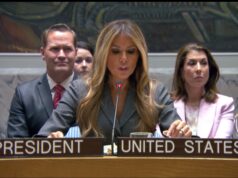Sections of the State Reauthorization Act would strengthen the U.S. partnership with Greece, Cyprus, and Israel — known as the “3+1” framework — if lawmakers can overcome a procedural battle that has stalled the legislation.
WASHINGTON, DC – by Petros Kasfikis, TO VIMA –
A set of provisions that would deepen U.S. security cooperation with Greece, Cyprus, and Israel has passed the House Committee on Foreign Affairs as part of the State Reauthorization Act, a sweeping bill that governs U.S. diplomatic operations worldwide.
These measures, the only ones this year to advance through Congress addressing U.S. relations with Greece and Cyprus, face an uncertain path on Capitol Hill, where a power struggle between congressional committees has left their fate hanging in the balance.
If enacted, they would prevent the expiration of the 3+1 Interparliamentary group, expand interparliamentary security cooperation, and formalize the 3+1 partnership at the executive level, creating a permanent interagency structure linking the United States, Greece, Cyprus, and Israel on defense and security. They would also move the U.S.–Cyprus arms embargo closer to being lifted permanently.
But the effort has become entangled in an internal turf war over who controls America’s foreign policy machinery, the House Foreign Affairs Committee or the Armed Services Committee, exposing a quiet institutional battle that could determine the future of U.S. engagement in one of the world’s most strategically sensitive regions.
Expanding the 3+1 Partnership
At the heart of the State Reauthorization Act is a set of provisions designed to deepen U.S. engagement in the Eastern Mediterranean through the 3+1 partnership with Greece, Cyprus, and Israel.
The initiative builds on a separate bipartisan proposal introduced earlier this year, the U.S.–Greece–Israel Eastern Mediterranean Counterterrorism and Maritime Security Cooperation Act of 2025, introduced and led by Representatives Nicole Malliotakis (R-N.Y.), Dan Goldman (D-N.Y.), Josh Gottheimer (D-N.J.), and Thomas Kean Jr. (R-N.J.).
That stand-alone bill has drawn co-sponsorship from 21 members of Congress, making it one of the most widely backed measures in recent years concerning U.S. relations with Greece and Cyprus.
The legislative effort took shape after Alexander Christofor, a Greek American policy advocate in Washington focused on promoting U.S. interests in the Eastern Mediterranean, noticed that the existing 3+1 Interparliamentary Group, created under the 2021 U.S.–Greece Defense and Interparliamentary Partnership Act, was set to expire at the end of 2025. Christofor raised the issue with congressional offices and helped mobilize bipartisan support to preserve and expand the framework before it lapsed.
As a result, the new provisions would extend the 3+1’s Interparliamentary Group’s lifespan to the end of 2027 and create a new security-focused subgroup with more Members of Congress. This subgroup would consist of up to six members each from the House and Senate, appointed by party leaders, to meet twice annually with legislators from the three partner countries.
Together, these steps would transform the 3+1 from a parliamentary dialogue into a permanent, law-based framework for strategic coordination, giving it continuity across administrations and embedding the region more firmly within Washington’s strategic planning. If passed, Greece, the Republic of Cyprus, and Israel, will need to create a system for selecting members of their own parliaments to meet with this group twice a year.
Additionally, it would for the first time institutionalize cooperation at the executive branch level by creating an interagency structure linking the United States, Greece, Cyprus, and Israel on defense and security.
The new Inter-Executive Agency Cooperation Group on Security in the Eastern Mediterranean would bring together officials from the Departments of State, Defense, and Homeland Security, who would meet twice a year with regional counterparts to coordinate on counterterrorism, maritime security, and other defense priorities.
Legislative Maneuvers
The path to this point reflects months of strategic positioning within Congress. Anticipating Chairman Brian Mast’s effort to reassert the House Foreign Affairs Committee’s control over foreign policy legislation, the leaders of the 3+1 bill divided their initiative in two.
The defense-related provisions were attempted to be submitted as amendments to the National Defense Authorization Act (NDAA), while the diplomatic components were incorporated directly into the State Reauthorization Act, which falls under the Foreign Affairs Committee’s jurisdiction.
According to sources familiar with the process, the inclusion of these provisions in the original text of the State Reauthorization Act, rather than later as floor amendments, was significant. The decision rests with the committee’s leadership and signals that a majority of members view these specific Eastern Mediterranean measures as a policy priority for the committee itself, not an afterthought.
In practice, this also means that the fate of the provisions will depend not on opposition to their content, which has drawn bipartisan support, but on the broader contest over which committee will shape the future of U.S. foreign policy.
Arms Embargo on Cyprus
The State Reauthorization Act also includes the core language of the End the Cyprus Embargo Act, introduced by Representative Chris Pappas (D-N.H.). Despite its title, the bill does not immediately lift the remaining restrictions on arms transfers to Cyprus. Instead, it extends the period during which the embargo may remain waived from one year to five, creating a pathway toward eventual permanent removal.
The measure builds on steps taken in recent years to align U.S. and Cypriot security cooperation, following Cyprus’s participation in regional counterterrorism initiatives and its growing defense coordination with the United States.
Next Steps
The House Foreign Affairs Committee has finished its work on the State Reauthorization Act and sent it to the House floor. For now, it remains the only legislation this year concerning U.S. relations with Greece and Cyprus to clear a congressional committee.
Once the government reopens, the bill will move to the House floor for debate. At that stage, any changes will have to be made through formal amendments. Because the measure is tied to the broader budget authorization process, its path will likely mirror that of other funding bills. If those pass intact and with enough bipartisan backing, its approval in the House is considered probable.
The greater uncertainty lies in the Senate, where Foreign Relations Committee Chairman Jim Risch (R-Idaho) has chosen not to follow Representative Mast’s example and does not plan to draft a corresponding State Reauthorization bill.
That decision leaves this year’s budget process in unfamiliar territory. The fate of the Eastern Mediterranean provisions now depends less on congressional support for the policy itself than on the institutional rivalry between the two chambers.
The Senate could still move to adopt parts of the House version through other legislative vehicles, but how and when that might happen is far from clear. As one congressional aide put it, in Washington’s budget fights, “when elephants fight, it is the grass that suffers.”
Petros Kasfikis is an accredited correspondent covering the White House, State Department, and Capitol Hill for MEGA TV and newspaper To Vima. For the latest political developments from Washington, D.C., you can subscribe to his YouTube channel: youtube.com/c/PKas?sub_confirmation=1






